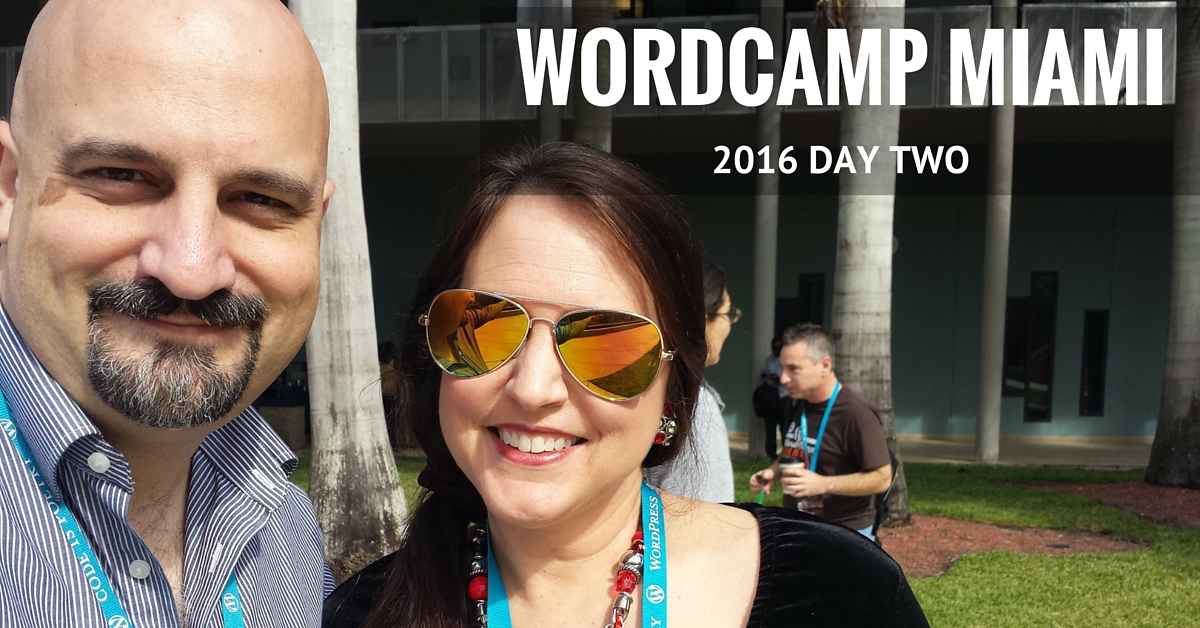My wonderful, gorgeous wife, Jill, and I arrived on campus at Florida International University for day 2 of WordCamp Miami 2016… just in time to enjoy another round of bagels & coffee from Einstein Brothers Bagels.
After the opening remarks, we got our dose of Cain & Obenland in the Morning, which was a riot.
It's Cain & Obenland in the Morning at #WCMIA with @michaeldcain & @obenland pic.twitter.com/u3Es6gNZPq
— David G. Johnson (@TheDavidJohnson) February 21, 2016
A highlight of the “Morning Show” was when they brought in Mark Jaquith for an interview.
The real @markjaquith makes an appearance with Cain & Obenland in the Morning #WCMIA pic.twitter.com/YjSMCNmkkT
— David G. Johnson (@TheDavidJohnson) February 21, 2016
Their final segment on WordPress news was fun. Some of the tidbits they shared about what’s happening with WordPress Core were exciting, including the fact that we’ll soon be saying goodbye to the “Bleak Screen of Sadnessâ„¢”
Jill and I stayed together for the first session of the morning, and we caught “Bootstrapping Your WordPress Business – Going from 0 to 10 Employees” with Scott Mann, who runs Highforge, an agency in Central Florida. Scott started with a compelling story about smoke jumper Wagner “Wag” Dodge and a famous firefighting incident at Mann Gulch which resulted in an on-the-spot innovation that continues to be used by firefighters today.
The point: when you’re bootstrapping your business, you’ll probably need to keep replacing your straps, because they’re going to get burned off!
Scott’s session ran the gamut from tools you can use as you bootstrap to finding and hiring the right talent and even when and how to raise your rates. Very practical. If you own a business and you’re bootstrapping and trying to grow, check out his slides or catch the replay if you can.
Next, Jill headed off to the “All Users” track, and I stuck around for “Product Marketing Tips for Commercial Plugins” with Chris Lema. Â While he was specifically focused on developers who are selling premium WordPress plugins, his actual talk contained a ton of useful tactics for any business.
The Afternoon
The Business track that the organizers put together for today has turned out to be utterly fantastic.
A very pleasant surprise was the panel discussion which featured Brett Cohen, co-founder of emagine, Karim Marucchi, CEO of Crowd Favorite Andrew Norcross, founder of Reaktiv Studios, and Kimberly Lipari, COO, Valet. The listed topic was, “How to Scale Your Business,” and the discussion was incredibly real and authentic. Most of all, it was really valuable.
Fantastic panel discussion about scaling your business #WCMIA @karimmarucchi @kimberlylipari @norcross @emagineusa pic.twitter.com/T7jJlHEuPa
— David G. Johnson (@TheDavidJohnson) February 21, 2016


